
Superwoman
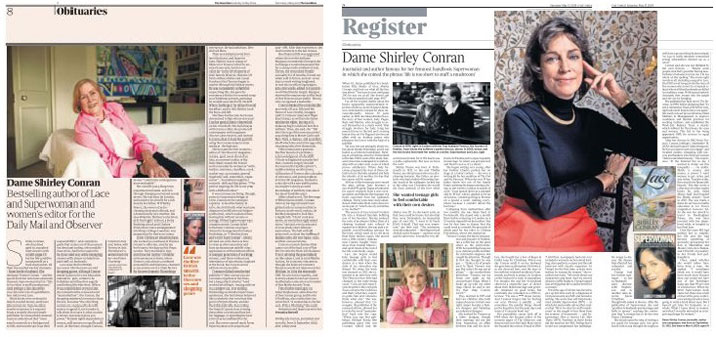
The Times majored on the first “bonkbuster” and its author’s pooh-poohing of 50 Shades of Grey – “you have to wait until page 200 for any sex at all”. The Telegraph had her championing women, through books and her maths projects. It was very interested in her financial troughs and peaks, from her downsizing after divorce to multiple flats in Monaco. The Guardian went in on “Life’s too short to stuff a mushroom”.
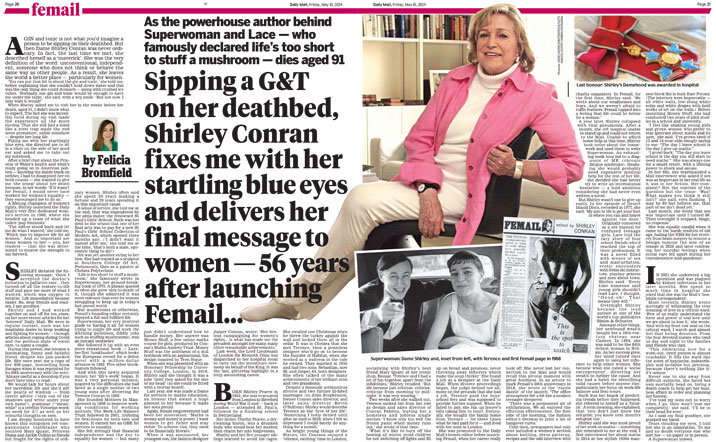
The Mail scooped them all, coming in a day ahead with her sipping G&T on her deathbed and a special command performance interview with Felicia Bromfield. Fittingly so, since Shirley Conran had founded the Femail section, having moved from being the Observer’s first women’s editor in the late Sixties. If you want an obituary, this is the one you should read. It is the one that captures the essence of an extraordinary woman.
That she should show loyalty at the last to her old paper and a long-time colleague surprises me not one jot. For I have my own memory of her kindness that is as vivid today as when I was its beneficiary 45 years ago. Please indulge me if I veer away from what newspapers have written this week to add this anecdote to the wealth of Conran stories.
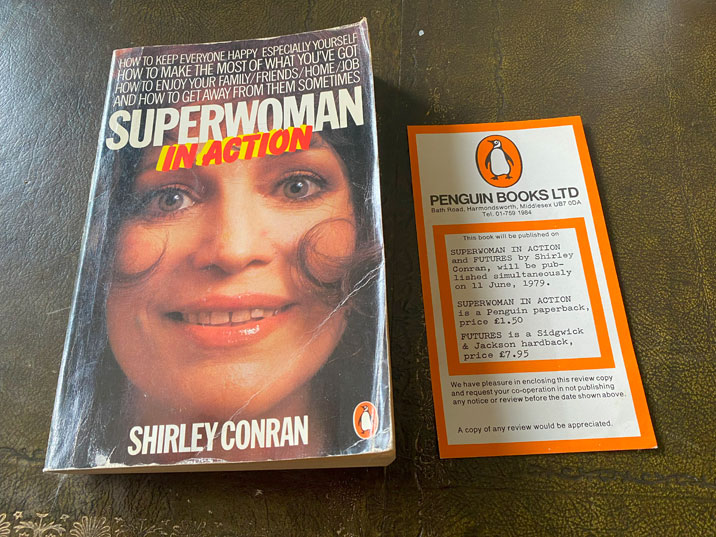
In those days, part of my job at the Evening Gazette in Colchester was to put together a weekly page of book reviews. We were hardly in the big league and so I was delighted to be invited to a party at a Park Lane hotel in June 1979 to launch the paperback of her second Superwoman book and the new hardback, Futures. I was overawed and out of place and spent a long afternoon gawping at the famous faces in attendance. In this, I was joined by her not-yet-famous sons, Jasper and Sebastian.
From time to time, I would ask the PR people if I could have a word with her. Though God knows what I would have asked her. No joy. The party fizzled out and she was about to take her leave. Then she noticed me lurking and one of her entourage explained that I’d been waiting to talk to her. “Bring her upstairs,” she ordered. “Come with us,” said one of the flunkeys.
I trailed along behind as she swept through the grand foyer, pausing to talk to posh folk – including Peter Ustinov – along the way. We went upstairs to her suite. She slumped in a chair, kicked off her shoes and peeled off a wig.
For the next hour, they talked about how the party had gone and about plans for the book promotion. Sometimes she included me in the conversation, mostly I just listened. Eventually, I was gently told I’d best be on my way.
I returned to Essex on a high and went straight back to the office to write it up. As my “real” job was to be deputy chief sub in charge of overnights, I could lay it out myself and so gave it a double page spread. A ridiculous amount of space on a local paper for a national book launch.
The whole experience was pretty amazing. But the best bit came months later. Just before Christmas, I received a postcard with a picture of the Queen. A handwritten paper speech bubble stuck on the front had her saying: “I hope Liz Gerard writes about me in 1980”. On the back was a note from Shirley Conran, congratulating me on the “best piece written about me this year anywhere, nationals included”. I was gobsmacked. Not only by the compliment, which was certainly undeserved. But because she had (a) read my feature, (b) found - or got someone to find - my home address, and (c) taken the trouble to doctor the postcard and write such a kind note.
Every time I contemplate (which is not the same as doing) some spring cleaning, her advice echoes through my head: “It’s as easy to paint a wall as to wash it.” Everything I have read about her since, particularly in the past few days, has confirmed me in my opinion that she was indeed a super woman.
So, ignore the salacious Times and the money-minded Telegraph. Felicia’s your woman on this.
Taking a politician's word for it
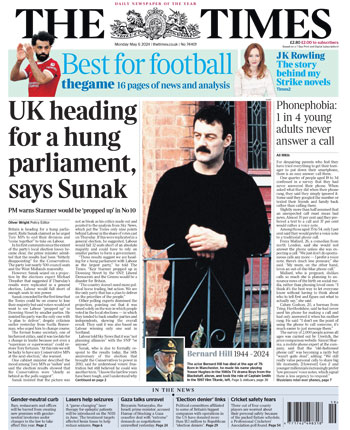
So much for the nostalgia. Back here in the 21st century, the first shots have been fired in what is going to be a long and excruciating general election campaign. And the papers have given us a good idea of what we can expect from them.
With Labour anything up to 30 points ahead in the polls and some devastating local election results, some Conservative papers had begun to look as though they might waver in their support for Rishi Sunak. But, the Sunday Express’s maverick “lame duck PM” splash notwithstanding, something appears to have convinced them that there is still all to play for; the defenestration rumours have been put to bed; the plotters and rebels have “given up and gone to the pub”. And so we have returned to “taking dictation” journalism. Rishi says (or is going to say) this or that, so we’ll put his words in big letters and then consign any caveats to the small type – or ignore them altogether. Like the Times splash, “UK heading for a hung Parliament, says Sunak”.
This confection came via some number crunching by an “elections expert” called Michael Thrasher, who reckoned that if the local results were replicated in the general election, Labour would win, but not get an overall majority. In Sunak’s words, would need to be “propped up” by the SNP, LibDems and Greens. And, according to the PM, the people wouldn’t like that, so they should vote Conservative.
Now in another newsroom, those words might be interpreted another way – as the prime minister publicly acknowledging for the first time that he’s on course for defeat and that there’s a possibility that Britain might get a coalition government. But in the Times, it is fighting talk – a call to arms.
In any event, as Oliver Wright explained in a subsidiary piece, Thrasher’s extrapolation looks offbeam. First, turnout is far greater in general than in local elections; second, far more “parties” stand in local than in general elections, including independents and local interest groups, and third, Thrasher sought to replicate results in England across the four home nations. I think most political observers would agree that Scotland and the SNP woes are likely to put the kibosh on that.
Exaggerating pro-Gaza effect
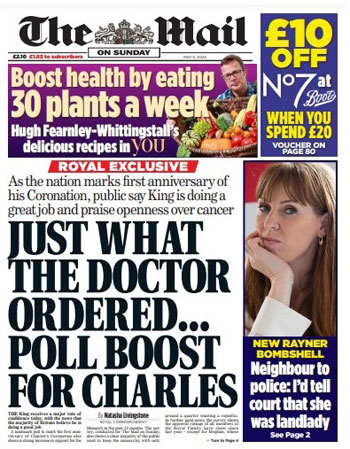
The Mail, meanwhile, wavered between defection and going on the attack. While the Express was saying, “We’re doomed!”, the Mail on Sunday was looking over there at a squirrel to hail a “poll boost” for Charles (with an obligatory side order of Angela Rayner scandal). Apparently, we quite like the King after his first year on the throne.
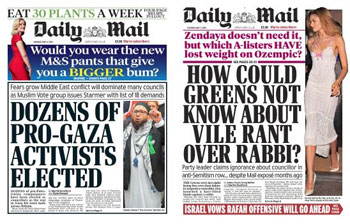
The daily wasn’t so afraid of those local elections. There was plenty of potential antisemitism to be found, from a ranty Green to all those pro-Palestinian councillors. “Dozens of pro-Gaza activists elected” shouted the Monday splash. Of course millions of Brits are pro-Gaza, but I guess that’s ok so long as you’re silent about it. It’s being an “activist” that’s the problem. Anyway, 40 council seats have gone to “pro-Gaza” candidates and this, according to Jacob Rees-Mogg, means that the Middle East will “dominate” town hall debates. Right. You may be interested to know that 2,600 seats were up for grabs last Thursday. So all of 1.5% of them have gone to these “activists”. Oh yes, they’re really going to set the agenda to the exclusion of the tree preservation orders and the bin collections.
Strangely, the bombardment of Rafah, the Biden arms threats, the UN votes and the diplomatic efforts to prevent further catastrophe in Gaza haven’t occupied huge amounts of space on Mail front pages this past week. That will presumably have pleased Jake, who probably wouldn’t want the Middle East to dominate our news agenda.
All friends together

There has, of course, been yet more “Rishi says” this week, with his national security speech at the Policy Exchange think-tank on Monday – the Telegraph, Mail and Express all leading that morning on the advance of what he was going to say and then, naturally, reporting it again the next day, after he’d said it. Funnily enough, none thought it worth commenting on or explaining the venue for what was an overtly party political address (stick with me, the country won’t be safe under Starmer). How appropriate was it for the prime minister to be standing, like a football manager on Match of the Day, against the backdrop of the wall plastered with the name of his hosts (sponsors)?
For those who don’t know, the Policy Exchange is a Conservative think-tank, founded 22 years ago by Michael Gove, Archie Norman and Nick Boles, and based – among other right-wing organisations and the old Vote Leave campaign – at 55 Tufton Street, in Westminster. It describes itself as the most influential think tank in the country, yet it is at the bottom of a funding “transparency league”. In other words, it boasts about how it can affect policy, yet refuses to say whose money (apart from Exxon Mobil) is behind it. Open democracy?
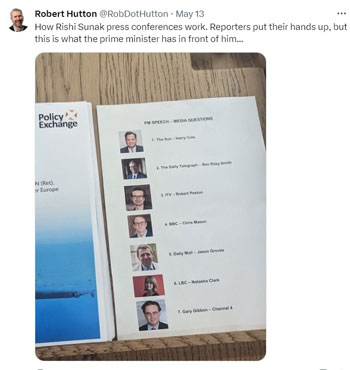
The extent to which this was an all-friends-together event became even clearer with the questions at the end. First up, Harry Cole of the Sun, followed by two more rightwing papers – the Telegraph and Mail – and five broadcasters. Did the prime minister look up around the room at the raised hands and randomly pick his questioners? No, he looked down at his lectern and the prepared list of those to be invited to speak, complete with handy thumbnail pictures to aid recognition – as tweeted by Robert Hutton. Not that Sunak needs a photograph to remind him of who Harry Cole is. Pippa Crerar of the Guardian? Come off it! She couldn’t even get into a No 10 Brexit briefing or on the Tory battle bus at the last election. I wonder why. But Beth Rigby of Sky did well to break into the favoured few. And it was all pantomime. None of the papers used the prepared quotes after their planted questions. The BBC’s Chris Mason did use his nugget. At the end of a speech that had been basically “Don’t trust Starmer”, he had asked: “Let’s cut to the quick here… are you saying the country will be less safe under Sir Keir Starmer?” Talk about a dolly drop.
It could, in another world, have been a poisonous question; one that could have been phrased as: “You have said we face dangerous times. By most accounts, you are about to lose an election and you are telling all those enemies – Russian, China, Iran, North Korea – that our country is about to become less safe. How responsible is that?” He could even have gone on to ask wasn’t this a case of putting party before country? But he didn’t.
Poverty: absence of critical analysis

Nor, in their two bites at this cherry, did most of the printed press do anything to examine what Sunak had said; as ever, they just repeated his words, sometimes with a panel – or in the Sun’s case a whole page of reasons to be fearful – to amplify the message. Take, for example, his claim: “We have reduced absolute poverty, pensioner poverty, child poverty.” Well, for a start, take a look at Gordon Brown’s report and accompanying Guardian article this week, about more than 3 million children born since 2010 who have known nothing but poverty all their lives.
And while the statistics may not be quite as bad as they were a couple of years ago – sort of justifying his assertion that “we” had made things better – look at the situation then. In March the BBC Verify team reported that the energy crisis after the Russian invasion of Ukraine caused the biggest leap in “absolute poverty” for 30 years, encompassing 12 million people – 12 million people – a rise of 600,000. The rate was now just under 18%, while a quarter of all children were living in absolute poverty. I’m sorry to be repetitive, but a quarter of all children?
Another report in March, this time by the Centre for Better Ageing, found that a quarter of people aged 60 to 64 were living in poverty, that progress in reducing pensioner poverty was under “significant threat of reversal” and that the poorest 20% of pensioners – those entirely reliant on the state pension – had just £41 a week after housing and heating costs to feed themselves and get from A to B.
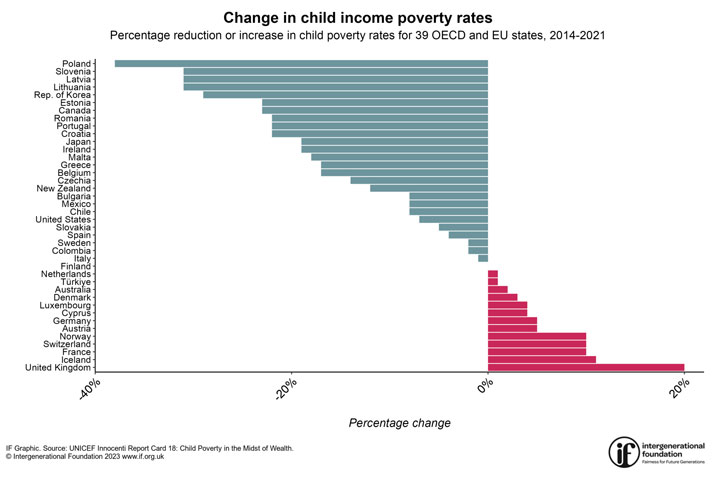
And then there was a Unicef report on child poverty at the end of last year that looked at what had happened in 39 OECD and EU countries between 2014 and 2021. Look where the UK stood in that league table.
But if you don’t trust these outside figures, look to the government. For on the very day Sunak was making his speech, Paul Maynard, parliamentary under-secretary (Department for Work and Pensions), said that poverty among pensioners had remained stable – with a 1% decrease in the rate of poverty, there had been no statistically significant changes since last year. But enough for the prime minister to hail the reduction.
Maynard also said that since 2010, more than 200,000 pensioners had been lifted out of poverty. But Labour’s Dame Angela Eagle countered that when the Conservatives had come to power there had been 1.6 million pensioners in poverty and the number was now 2.1 million. Which all shows the perils of combining absolute numbers and proportions (since there are now more pensioners overall, not only those on the breadline).
But don’t expect the papers to look at these figures in the round and give readers an accurate picture. They just wait for the next think-tank or charity or Panorama report on one particular aspect of poverty and regurgitate it. The BBC’s Michael Buchanan – who must have the most depressing job in journalism – tries his best to shine a torch in the dankest, dingiest corners. The Guardian might do something worthy on occasion or the Mirror produce a “special”, consisting of a couple of case studies and a panel of random statistics. Most of the rest either don’t care or are deliberately looking the other way. If you want to know anything about this stuff from the prints, the FT is pretty much your only hope. As I say, 12 million people, a quarter of all children. But look! Up-herself Meghan’s doing a “royal tour” in Africa. Does she really want to be president?
The Express – back on message
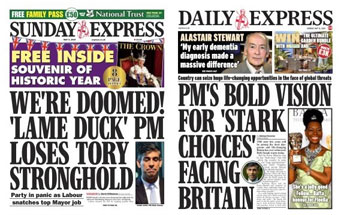
Sorry about that. Where was I?
The Express – after a blippy couple of days that produced splashes bewailing: “We’re doomed!” and “Only big tax cuts can save Tories now” – is back on track, hailing Rishi’s “bold vision”, and returning to its old habit of selective reporting. Last week, it was demanding that the “myth” that migrants boost the economy must be busted.
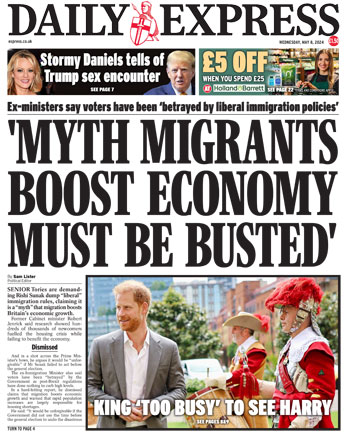
This was based on a “scathing” report by the Centre for Policy Studies and the former immigration minister Robert Jenrick (also known for quitting the government over the Rwanda bill being “too weak”, for painting over Mickey Mouse at “too welcoming” asylum centres and for being a potential leadership candidate). The Centre for Policy Studies is another rightwing think-tank, based not at 55 Tufton Street, but next door at number 57. The conclusions of report were questioned by Kings College London economics professor Jonathan Portes and robustly defended by CPS director Robert Colvile. Needless to say, the Express neither explained the provenance of the report nor gave any counter view.
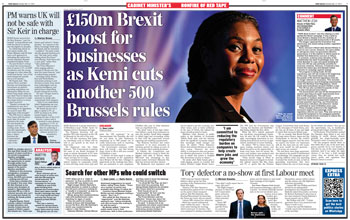
Another favourite trick is to avoid giving context. Just throw around big numbers, whether millions or hundreds of millions or tens of billions. It all sounds impressive or expensive, depending on what you want the readers to think. On Tuesday, the Express had a front-page puff and inside spread on Kemi Badenoch slashing EU red tape to “save businesses £150m-a-year”. (No, you don’t need those hyphens, it’s not adjectival, but life’s too short.) Inside, the story said that cutting down on form filling would save small and medium businesses that employ fewer than 500 people £150m a year. No doubt they will be grateful.
The official government definition of an SME (small and medium enterprise) is split into three – micro, small and medium, with the largest of those having a turnover of under €50m and fewer than 250 on the payroll (heaven knows why the post-Brexit British government uses the euro for its definition, best not ask). A “small” business has a turnover of under €10m and fewer than 50 employees. There are 37,000 of those. And a total of 5.5 million SMEs. And presumably more with between 250 and 500 employees. So helping 2,000 of them doesn’t seem to be a big boon.
Meanwhile, those businesses were last month confronted with new government-imposed post-Brexit export fees that some complain could wipe out their profits. Also, an Allianz survey last October reported that 80% of SMEs had found that trading costs had increased and that their businesses had been disrupted. Last year saw a record number of insolvencies among such businesses.
Kemi’s “slashing” of red tape will probably make a few lives easier. It’s perfectly reasonable of the Express to report on it. But there are other factors worth considering.
The plight of private schools
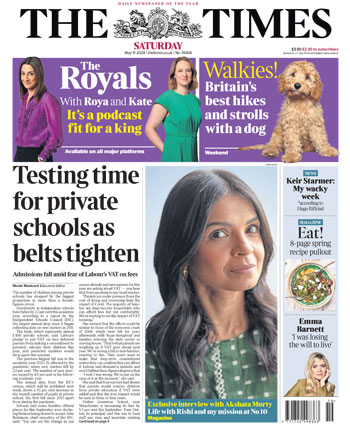
Still on the question of context, let’s take a quick look at last Saturday’s Times splash, “Testing time for private schools as belts tighten”. The potential impact of Labour’s plan to impose VAT on private school fees is a fair topic for the paper to examine. One imagines a good proportion of its readers send their children to private schools and they will be worried about having to find an extra 20 per cent. This story wasn’t written from their perspective, however, it was more concerned with the plight of the schools as parents turn away and whether their businesses would survive.
Now let’s look at the figures in the story. Enrolments are down by 2.7% this academic year, the biggest proportion in more than a decade. And here’s the killer: the total number of pupils at independent schools has fallen by 0.1% - the first fall since 2013, apart from during the pandemic. Yes, you read that right. 0.1%. One school is cited as having raised fees by 5.5% this year, with its headmaster saying that parents were worried, angry and confused at the way they were being “targeted”. They don’t, he says, see themselves as privileged or elite.
Just over half a million children attend independent schools. More than 10.3m children go to state schools. The government has trumpeted its £60bn schools budget for this year as the “highest real-terms spend per pupil”. The Institute for Fiscal Studies – which describes itself as an independent economics research group, although some accuse it of leftish bias – agrees that the total budget is the highest ever, but also notes that recent increases have only just put the total spend back to pre-2010 levels. And there are more children now. And a lot more with special educational needs, that require more money. And capital spending has dropped in real terms. And that’s without even thinking about RAAC. Few would contest the notion that state schools are struggling. Did the Times mention any of this when it decided that a 0.1% decline in the number of children going to independent schools was the most important story of the day last weekend? Of course not.
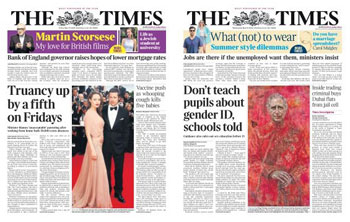
What do you expect? This was a story about a specific sector, you can’t expect them to do the runaround of the whole education spectrum every time it has a particular story to tell. Ok. Has the Times written anything about how state schools are coping, their problems, their hopes, their fears in the past month? Nope. Unless you count the impact on house prices of being near a “good” one, blaming WFH for a rise in Friday truancy, or a ban on sex education for under-nines.
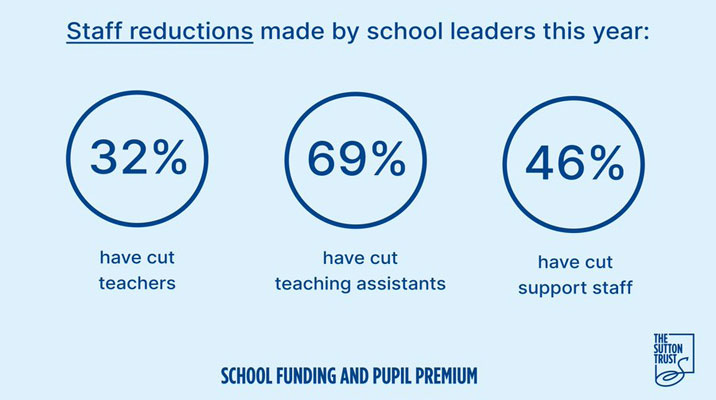
Last month the Sutton Trust, whose stated aim is to tackle education inequality and improve social mobility for young people, carried out research that found schools were cutting staff and outings and using the “pupil premium” to plug gaps in their budgets. In the same month, the Guardian splashed on a Unison report on how much work was being shifted from teachers to teaching assistants – “the scale of teaching crisis revealed” – and, just as with nurses, when there’s a staff shortage, schools have to pay more for agency staff to fill in. But no one else was interested. The Sutton Trust are a load of do-gooder lefties and the unions have an axe to grind.
Maybe they are. Maybe they do. But these things still matter. There is a similar lack of interest over the extent to which clinical tasks traditionally entrusted to GPs are being delegated to practice assistants. Why?
The Times joins ‘Rishi says’ group

I’m banging on about the Times because it used to be much more even-handed than it is today. We know that the Telegraph, Mail and Express are dyed-in-the-wool Tory, we expect the government spin. Just as we know that the Guardian and Mirror are of the left. But that “hung parliament” story appears not to have been an aberration, but suggestive of a full-scale conversion to the “Rishi says” school of journalism.
Heaven knows what it was thinking of, reporting that the London mayoral contest was “close” (as did Laura Kuennsberg) before a single vote had been counted. And to state with some degree of certainty that Andy Street would hold on in the West Midlands (he didn’t). Why did it buy into those nonsensical briefings? That Friday truancy splash last week was another “taking dictation” story, courtesy of the education secretary. What does it take to bash home these basic rules:
Just because a minister or government “source” says it:
- Doesn’t make it true;
- Doesn’t mean you have to report it;
- Doesn’t mean you don’t have to look into it further;
- Doesn’t mean you don’t need to offer context or a counter view (ie, something more than a quick duty “Labour says” quote at the end).
Natalie Elphicke
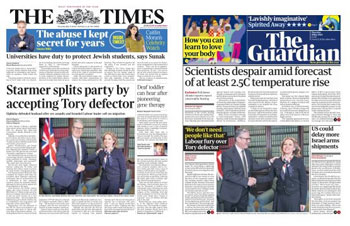
Which brings me the Times’s take on Natalie Elphicke: “Starmer splits party by accepting Tory defector”. “Why can’t they just tell the story instead of spinning it?” asked an old colleague as three of us had a grumble-in at lunch last week. That would normally be my mantra. But on this occasion, she was in the minority. Our other friend and I agreed that the Labour reaction, rather than the defection itself, was the story.
The Guardian thought so, too, headlining its picture, “We don’t need people like that: Labour fury over Tory defector”. It declined, however, to make it the lead, preferring instead another gloomy climate change prognosis. Which is, of course, the bigger problem, but did feel rather like a cop out.
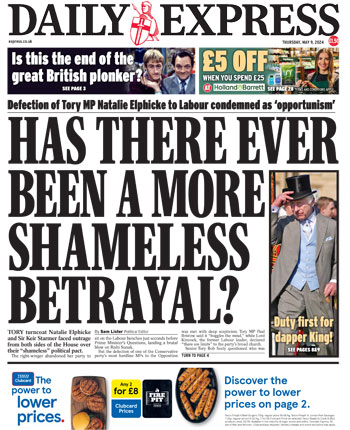
The Telegraph gave the defection only a par on the front, the Mail found another stick to beat Labour – its candidates list showed it was going to “pander to sectarianism” – and the redtops took flight to the King snubbing his younger son on his flying visit for the Invictus Games church service. The Express meanwhile completely lost all sense of proportion with its splash, “Has there ever been a more shameless betrayal?” You might think that a newspaper so rooted in the past might be able to think of a more egregious example than an attention-seeking MP crossing the house. Brutus, perhaps? Judas Iscariot? Or, if we’re looking closer to home, Philby, Burgess, Maclean, Blunt?
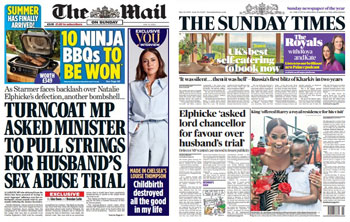
From then on, it all became surreal. On Sunday, the Mail came up with an “exclusive” on how the “turncoat MP” had asked a minister to pull strings over her husband’s sex abuse trial. An exclusive that shares most facts and many quotes with the lead in the Sunday Times. This alleged behaviour, apparently corroborated by the then lord chancellor, Robert Buckland, was going to “embarrass” Keir Starmer.
Let’s get this straight. In 2020, Natalie Elphicke approached Buckland and asked him to interfere where he shouldn’t – and wouldn’t. He appeared to have behaved properly. But nothing was said about it at the time. There were no questions for the then PM Boris Johnson or either of his successors to answer about having her as one of their MPs. But now she is sitting on the Labour benches, it is “embarrassing” for Starmer. Because his vetting processes (under that wicked ethics woman Sue Gray) didn’t unearth this dark secret?
What’s more, by Monday he was being “pressed” to investigate the claims. Because it all reflects so badly on him that a rightwing Tory MP sat blithely on for four years without anyone being remotely worried about her behaviour – until she switched sides and suddenly two Sunday papers were able exclusively to reveal something that had doubtless been fed to them by someone within the Conservative party.
Do they really think their readers are so thick they can’t see through all this? Do they really think that by the time we get to vote in the autumn that it will make the slightest difference to the outcome?
Mirror looks the other way

And where has the Mirror been while all this has been going on? Hiding behind football and the royals and dead teenagers. As ever. It seemed quite happy with Labour taking Elphicke (on the 8-9 spread, Harry being the splash), with the headline “Tory departee”, the promise of more defections to come, and an opinion piece saying that while some didn’t think Labour should be so welcoming, “election winners can’t be choosers”. Well, they can, actually. The follow-up story about the attempt to influence the trial date was consigned to a couple of pars on page 11.
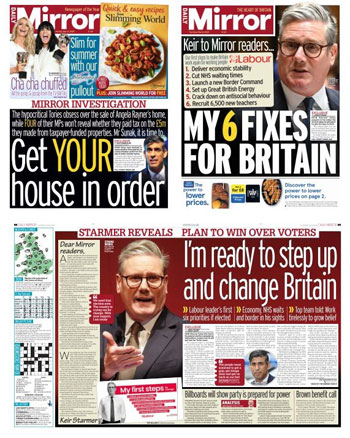
The paper did do a good number asking four Conservative MPs to say whether they had paid capital gains tax on the sale of “state-funded” homes, comparing their alleged reticence with the Tory “obsession” with Angela Rayner. And today it has a “Keir says” splash on his six “fixes” for Britain (he previously had five “missions” while Rishi had five “promises”, so he had to go one better), with, inevitably, a personal letter to Mirror readers on the spread inside. Just as Rishi always has a message for Express and Sun readers. It seems what’s sauce for the Tory goose is equally good for the Labour gander.
But its heart isn’t really in politics any more. This is fine if you want to be a jolly pop redtop, but it’s a bit concerning when you’re the only non-Tory popular paper, the country is heading towards a general election, and all the rivals have already got their troops mustered on the front line. The past fortnight has seen three leads each on those football / teenagers / royal mainstays, a whooping cough alert, a sick soap star, and Ant McPartland’s new baby.
On Tuesday, when the idea of prescribing Ozempic to forestall heart attacks was the popular choice, the Mirror went for Manchester United wags having to pay their own way to see the cup final. Just exactly how much sympathy or even interest did the backbench think that would evince among its readers?
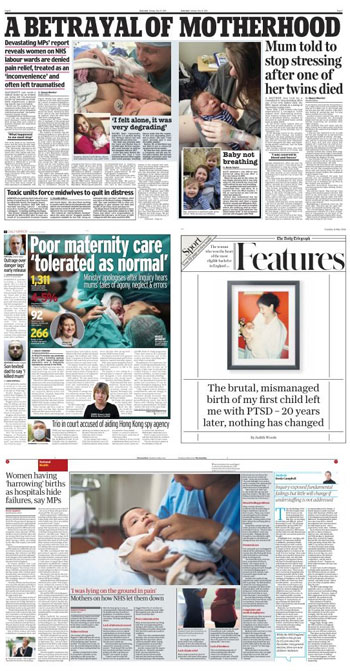
Personally, I would have thought the MPs’ report on the parlous state of our maternity services and the ordeals women are being put through would have been a better choice. But, no. Page 6 will do. And not even the whole page. As to the rest, the Times had been ahead of the field, putting it on the front the previous day, with more inside. On publication day, the Mail, as you would expect, went big-ish (preferring an Ozempic splash), with a spread on the “betrayal of motherhood”, a leader and, the next day, a Sarah Vine column. The Guardian gave it the 6-7 spread; the Telegraph a news story and a personal piece by Judith Woods as the main features spread. The Express wasn’t remotely interested. Not a word. This a story that affects so many millions of families. Yet compare the coverage with the latest gender identity “scandal”. Not a single splash to be seen.
Compare and contrast: Keir and Rishi announcements
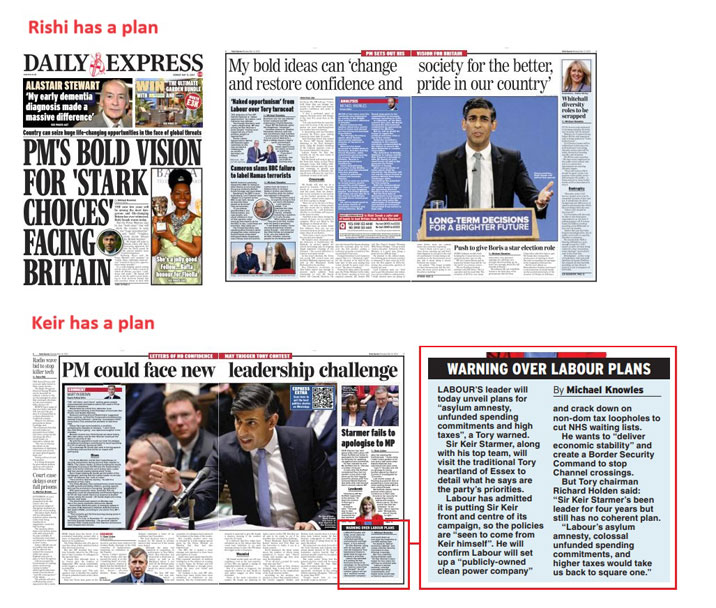
Returning to Keir’s big announcement for a moment, it’s perhaps worth comparing today’s coverage with that of Tory launches. Mostly because it was so predictable and because it is, I suspect, a fair indicator of where we’ll be once the campaign proper starts (or has it already?).
The Times and the i were the only papers other than the Mirror to mention it on page one. The Times perhaps returning to its more neutral path after the “Rishi says” detours last week, had a pretty straight-down-the-line splash, turning to the bottom of the politics spread, while the i had a puff pointing to the top of its politics spread.
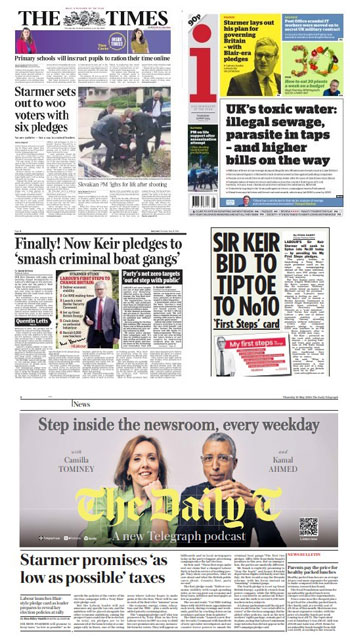
The Guardian, which might have been expected to be supportive, pushed it back to the 18-19 spread, but that was largely because it had decided to go huge on the David Copperfield sex allegations. That was given the bottom half of the front (under the Slovakian assassination attempt) and five inside pages. Both the Telegraph and the FT put Starmer on page 2, the former as a shallow page lead under a huge podcast puff, the latter as a single.
Then we get into “hiding” territory. The Mail, which had a “Rishi says” column and page lead on gender teaching in schools on page 10, managed a similar number of words – around 500 – for its “Finally! Now Keir pledges to ‘smash criminal boat gangs’” on 18, coupled with a sneering column by Stephen Glover on 19 and a sneering sketch by Quentin Letts on 26. The Sun had 238 words on Keir tip-toeing to No 10 on page 14, while the Express limited the announcement to 150 words at the foot of the politics spread – angled on what the Tory chairman thought about it.
Along the way, the policy was variously described as “my first steps”, “six promises”, “six pledges” and those “six fixes” in the Mirror.
All this was, remember, a preview of what is being announced today, so in one sense should be compared with the three-splash advance on Sunak’s security address. But only in the sense of how papers treat statements before they’ve actually been made and whether they then repeat it all the next day.
The two big “moments” are alike in that they are both overtly party political and are clearly the opening salvos in the election campaign. But there’s a difference: Sunak’s was a runaround of why voters shouldn’t turn to Labour – Project Fear, many called it, with intentional irony. Starmer’s is his first enunciation of what he actually intends to do. Since he, rather than Sunak, is the man who is widely expected to have to put his words into action, it is beholden on our newspapers to tell readers what he has to say.
Naturally, they will all have a view and spin it (I wish they wouldn’t, but they will), but as the friend I mentioned earlier says, let’s have the facts first and the opinion, separately, later.
Let’s see what they all do with it tomorrow, once Sir Keir has had his say.
Not holding power to account
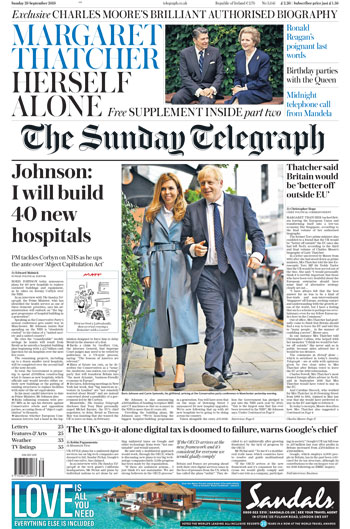
This all sounds very downbeat. My big gripe is that important aspects of our society and our infrastructure are under-reported or completely neglected by newspapers who make such a big deal of their importance in “holding those in power to account”. As a country, we were promised 40 new hospitals, 50,000 more nurses, 20,000 more police officers. They haven’t appeared. Yet instead of checking on progress (or lack of it) there, papers like the Express are busy telling readers “Rishi says” everything is going to be wonderful, while the Mail bangs on about when we’re going to get tax cuts.
It’s not that I want them to apportion blame and say “Look at this, you government ministers, why haven’t you made this better?” I want them just to do the first bit: to look. At the schools, the hospitals, the roads, the trains, the insurance premiums, and most of all the poverty. I don’t want them to pump out statistics and say “See! It’s ten times worse or 40 times better than under the other lot” with soundbites from either side to score party political points. I want them to move away from their desks and go out into the real world, almost as a war correspondent would, and to come back with a picture of the scale of the problems, what is being done to mitigate them, how they are impacting on other areas of life, and where things are going right.
In other words, I don’t want comparisons. I want absolutes. If I can’t heat my home or afford my favourite food, it doesn’t help to know that I would have been able to do so ten or twenty years ago or that I might be able to in the future. I’m concerned about the here and now; I need to have my situation recognised and to have my voice heard. That is the job of proper reporters. And without that information, nobody’s life can improve.
Following the clicks
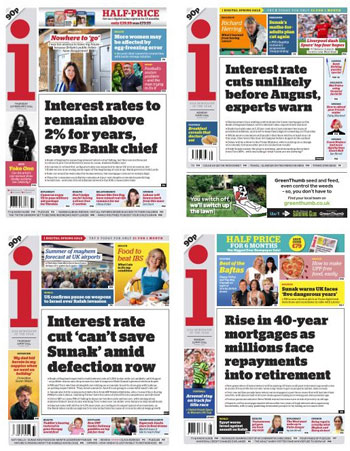
I do think that a big part of the problem is that news organisations have too many tools at their disposal to tell them exactly what readers are interested in and how long they spend on a story. Reach’s Jim Mullen has emphasised the importance of “eyeballs” and the Times’s Tony Gallagher admitted at a media forum last month that coverage was influenced by detailed information on what goes down well.
That’s all very useful and sensible, but it is leading to a narrowing of the focus, to the detriment of “lowering” but important issues, such as those I’ve been moaning about above, and also breaking stories that come out of nowhere and don’t conform to the pattern. It’s why some papers keep beating the gender identity / culture war drum, why the i is obsessed with mortgage rates and the Star with the weather, why everyone leans on the royals. (To be fair, the i probably has the greatest diversity in splash subject matter – and is to be especially commended for the one on endangered wildlife on Tuesday.)
Think of a restaurant that offers five dishes. If lots of people like the burger and only a couple fancy the quiche, the next week’s menu will definitely include the burger, but the quiche may have to make way for chicken pie. If that doesn’t do well either, and clients stick with the burger or fish and chips, the chef may decide to reduce the menu to four dishes. It may just have been unlucky that, on those particular days, the quiche and the pie didn’t hit the spot for the people who happened to go in. Now they’re being offered to no one. But those burgers, they’re a winner. They’re going to be on the menu every single day.
That is what’s happening to our newspapers and their websites. In a digital age where internet space is unlimited, instead of being offered more choice, readers are being offered less. Resources are tight. Few, other than the Mail, are willing to invest in their journalism or risk being a little more adventurous in their output. Specialisms and general reporting staff are being cut.
Limiting the menu to trusted big sellers may make some business sense for our restaurant, but it’s unlikely to attract new customers looking for something different. The same goes for newspapers. And no amount of half-price special subscription offers will rescue them.
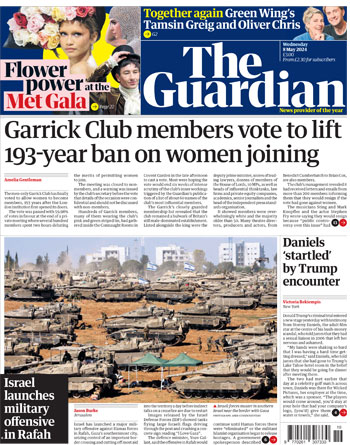
So, how have those staples served our papers over the past couple of weeks? The broadsheets have been pretty diverse, roaming across home and foreign affairs. The Guardian was obviously pleased as punch when the Garrick voted to admit women, giving it precedence over the start of the offensive on Rafah and Stormy Daniels’ testimony in the Trump trial. But little – even Stormy, who managed only a puff for the redtops – has disturbed the natural order of things for the tabs: “Rishi says”, migrants, house prices, obesity, health scares (whooping cough), gender wars and the weather.
We’ve looked at the Mirror already, while every single Sun splash of the past fortnight has been built on a royal, a sportsman or a tv show. Some, it has to be said, have been good stories by most measures – the Gary Barlow burglary for one.

But in other instances, those bankers have come back to bite the redtops in the bum. Both the Mirror and Sun had “exclusives” on Harry and his Dad meeting up at last. Only for such hopes – if hopes they were – to be scuppered a couple of days later. Still, look on the bright side, it made another couple of lead stories, first when Harry was told “sorry, son, too busy” and then when they were so near, yet so far apart…

The Star, meanwhile, has gone its merry way with random bits of bonkers science from “boffins” and heatwave predictions. My favourite offering was Tuesday’s splash based on a Trump rally in New Jersey over the weekend. The Times and Guardian had already reported his reference to Hannibal Lecter, but while it was late, the Star had panache. Here is the splash text in its entirety:
Orange manbaby Donald Trump has praised psychotic movie character Hannibal Lecter as a “wonderful man”. Totally normal, right? Full story: Page 7
Baftas: The losers were…

Sticking with the lighter side, the dresses won as usual at the Baftas last weekend, with Tess Daly and Claudia Winkleman both in white, making the most front pages after Strictly won the best entertainment show award in its 20th anniversary year.
Naturally, there were plenty of other angles – Floella Benjamin’s fellowship, Happy Valley (seems like forever ago now) earning Sarah Lancashire the best actress prize and the way the cast tricked young Rhys Connah into collecting the “best TV moment” award (for the final scene) solo. You’d think there was no “wrong” way to cover the event.
But the Sun’s approach was decidedly odd. It majored on Strictly, giving it the first nine pars of the story, including quotes from Daly and Winkleman. So far, so good. Then the next sentence was “Meanwhile, despite high expectation and being nominated in four categories, Netflix's royal drama The Crown did not win anything.” That was weird enough, but the story went on to list all the actors from the series who had been nominated but came away with nothing. Before finally moving on to, “But there was a touch of real royalty…” with Prince William making a video appearance to present Benjamin with her award.
I know the Sun dislikes the Crown and isn’t that keen on Netflix in any form (although it managed a Baby Reindeer splash last week), but to spend three pars telling readers what it didn’t win before highlighting those who were successful seems a bit like axe grinding.
A tight fit

“It’s not made of rubber, you know!” is a phrase that will resonate with old hands and probably leave young journos bewildered. It was a favourite back in the bad old days of hot metal when subs failed to “count” properly and the poor compositor was trying to chip out space to make a headline physically fit on the page.
Nowadays, there are no comps and subs don’t have to count. They can see on the screen in front of them whether the headline will fit. And if it doesn’t, well, there are those nice buttons they can click on to squeeze both the type and the space between the letters. In the early days of “new tech”, this was a much-abused facility. Now there is usually more discipline.
But take a look at these two three-column Mail splashes from Bank Holiday Monday and yesterday. Isn’t it amazing how the first has a “count” of 9½ and the second of 12? Isn’t modern technology wonderful? No. As Liz Truss might say: It. Is. A. Disgrace.
Correction
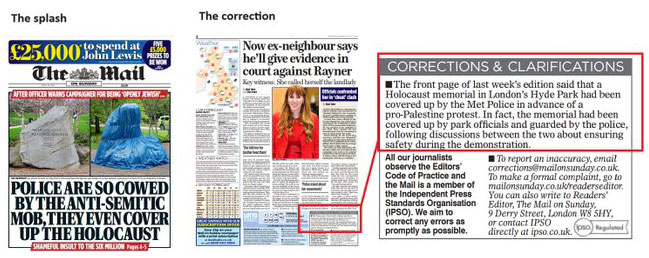
And while we’re at it… last time we met, I wondered whether the Mail on Sunday would publish a timely correction to its splash about the Met covering up a Holocaust memorial. It did. So good for that. I know that corrections have a dedicated spot and that that’s the way it works. I also see that no paper is going to publish a correction as a splash unless forced. But when you look at the disparity in the presentation, you do see why there is such a vociferous lobby calling for equal prominence.
And another thing, who thought this would be a good sell for Scotland?
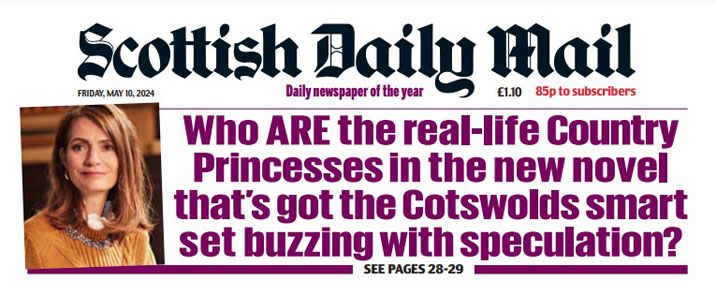
Front page of the fortnight
I really liked these from the i, an interesting departure from the standard text-heavy formula and the blue background makes for a more arresting cover.
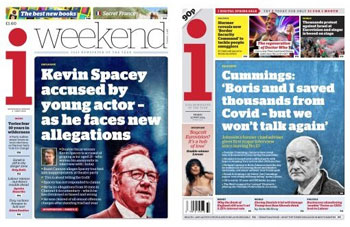
However, despite everything I have said above (and in the past) about the over-reliance on the royal family, I thought this take on the Harry visit the most pleasing. Everyone else went on the “worlds apart” angle. But while that was the obvious approach, this was the more pointed story: while the royals stayed away, the Spencers turned out en masse to support Harry at the Invictus Games tenth anniversary service in St Paul’s.
Which, of course, reminded everyone of that promise his uncle made at that funeral in that other church 27 years ago.
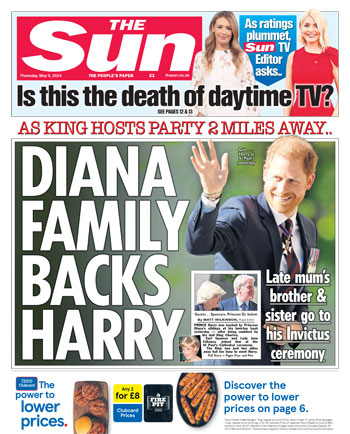
Liz Gerard’s Notebook is a fortnightly column published in the InPubWeekly newsletter. To be added to the mailing list, enter your email address here.












